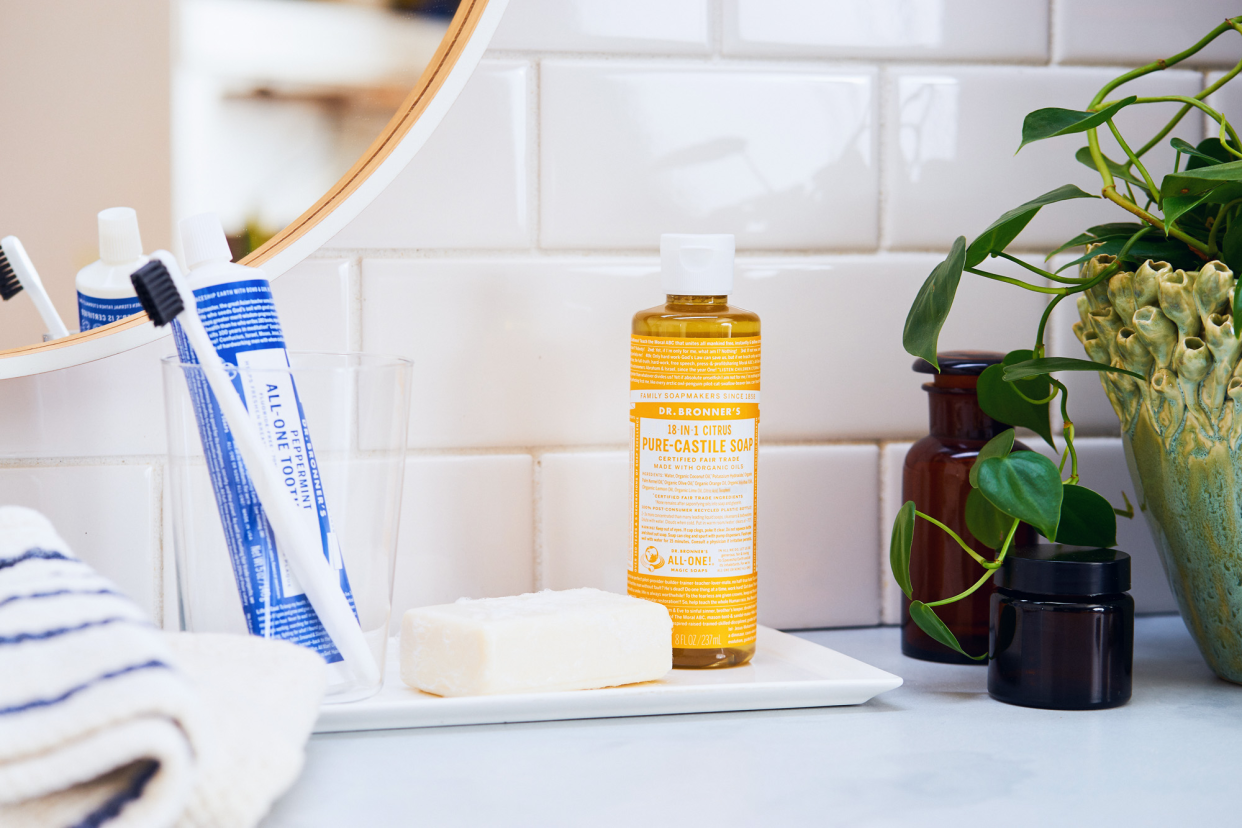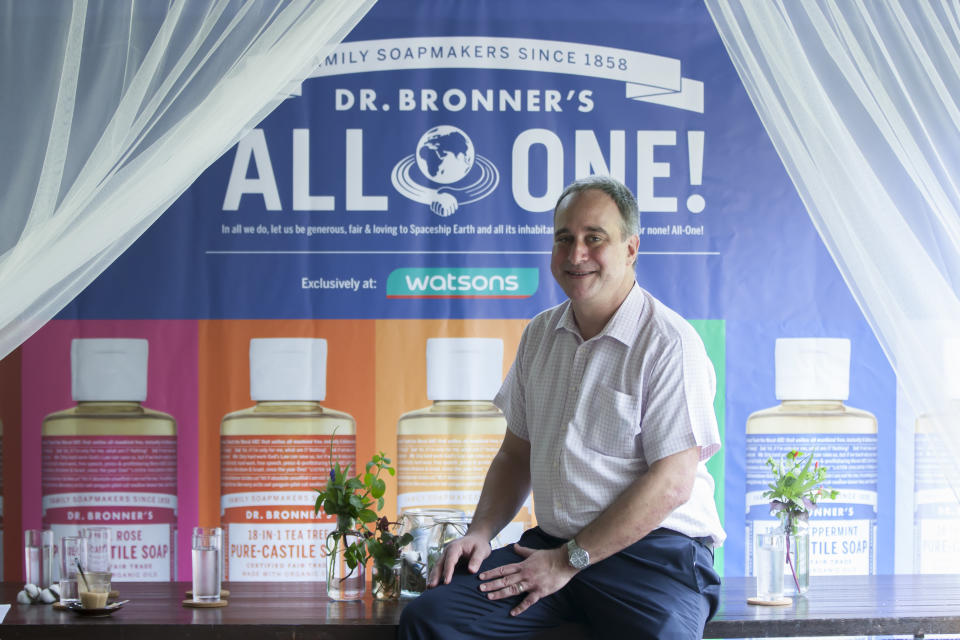Soap label Dr. Bronner’s relaunches in Singapore through retail partner Watsons

SINGAPORE – American soap brand Dr. Bronner’s returns to Singapore after a two-year hiatus, through retail partner Watsons. What’s interesting for conscious consumers is that the 100% vegan and cruelty-free soap makes use of USDA-organic certified and fair trade certified ingredients for all of its major supply chains.
Having expanded into other Asian markets such as Japan, Korea, and China, the brand is looking to include Southeast Asia in its international distribution. For the Singapore market, the brand is releasing eight varieties of Dr. Bronner’s Pure-Castile Liquid Soaps, including Baby Unscented, and scented varieties infused with organic essential oils – Peppermint, Lavender, Tea Tree, Eucalyptus, Rose, Citrus Orange and Almond. Five of these scents are also available as bar soaps alongside other personal care products, such as Dr. Bronner’s Organic Lip Balms, Dr. Bronner’s Lavender Organic Hand Sanitiser and Dr. Bronner’s All-One Peppermint Toothpaste.
In conjunction with its grand relaunch in Singapore on 10 October, Michael Bronner, President of Dr. Bronner’s and fifth generation soapmaker of the Bronner family, was in town to share the brand’s 160-year history of soapmaking. Yahoo Lifestyle Singapore spoke to Bronner about his grandfather’s difficult life journey, to starting the soap brand and how running the family-run business allows him and his team to make fast decisions.
Watch:
I read that your grandfather led a harsh life during the World War. Could you share with us the history of your family as soapmakers?
Dr. Emmanuel Bronner was my grandfather, and his grandfather started making soap in Germany in 1858.
So we were a family of soapmakers and we're actually called master soapmakers, which is very much like being a master carpenter or master tailor. My grandfather was raised to become a filmmaker; he went to school and became a master filmmaker.
But he ended up leaving Germany before the bad stuff (World War) started happening; we had two factories in Germany in 1929. He came to America with no money and ended up moving to Chicago where he slept on top of the YMCA with a pillowcase filled with plastic scraps.
Just by his work ethic and perseverance, and obviously his key expertise, he became the immigrant success story. He was a consultant to various companies and he held several patents. When Hitler came to power, he tried to get his parents to come to America. They said, ‘No, Hitler will be forgotten; people will see right through Hitler, and he'll go away.’ Unfortunately, my great grandparents were put in the camps. The last letter my grandfather received from his dad - all the words were blacked out except for three - it said ‘You were right.’
I think that's the crucial question of, why at that time, did he pursue this mission for world peace and made soap when it would be so easy for somebody to, you know, act in hate and revenge, like, I'm going to get Hitler. He went the other way, saying, ‘No, we need to, now's the time to come together.’ He was very passionate; whether you're Jewish or Christian or you're Muslim or Hindu, whether you're black, you’re a man, a woman; we all share a common theme of humanity. And what unites us is greater than what divides us.
At that time, people actually thought he was crazy. I dare say that the line between madness and genius is very thin. Yesterday's crazy person is today's missionary. He was put in a mental asylum in Chicago where they gave him shock therapy, and he ended up escaping three times. Twice he was put back, but the third time, he escaped and hitchhiked out to California, where he found himself in Pershing Square Garage in Los Angeles.
He gave speeches while standing on literally, soap boxes, talking about world peace, and eventually he became so popular. He moved into auditoriums and people came to listen to him, and he always gave them clear bottle soap (sic) that he made at home. Well, the soap became so popular that people were coming for the soap and not listening to him. Today, we’re both a mission-driven company and a soap company.

Growing up, do you remember your grandfather fondly? Do you remember any life lessons he might have shared?
Well, it was really interesting. When my grandfather had that shock therapy, it made him start to go blind in the 1960s. I was born in 1975 and today I'm 44. And by that time, my grandfather was almost completely blind. So my memories of my grandfather were very much him putting his hand on my head, trying to see how tall I was. And he always spoke to me as if I were a professor of religious studies, even when I was six.
A lot of the messages kind of went over my head as a kid. But when I was in high school, I would spend the summer with him; I'd work for him and I lived with him. That's when I realised, wow, to have a mission greater than your own family or your own. To just think outside the box and trying to do what you can to bring people together. That resonated very much with me, and it just really inspires me to do what I think is right.
He was very passionate; whether you're Jewish or Christian or you're Muslim or Hindu, whether you're black, you’re a man, a woman; we all share a common theme of humanity. And what unites us is greater than what divides us.
What's it like working in a family-run business? What are the pros and cons?
I got a brother who is two years older, and I work with my brother-in-law who is our chief operations officer. My sister is a blogger and my mum is our chief financial officer, so she still pays me my allowance (laughs). It's the pros that we believe in; we can come to very difficult decisions quickly because we have unbelievable trust in each other. There are times when we've funded causes for $1 million to $2 million dollars.
Let's say, labelling genetically modified foods. To do so is a big decision. We can make those decisions sitting at dinner, whereas it would take a corporation a long, long, time to get the shareholders and the board to act. No matter how difficult conversations are with my brother, I always go home happy, even though they're very intense.
As for the cons, some issues from when we were 12, kind of come up. I'm very simple and I do silly things, very silly things; I didn’t like it at all (laughs). I think really, just maintaining the work-life balance because to a lot of us, family is the time when we can get away from work. It's part of your life. But when you're working with family, you have to choose to make that time.

With so many competitors out there, and with a long-standing brand like Dr. Bronner’s, how do you stay relevant? Do you update your packaging?
They’re minor, minor updates. It’s interesting, as we've continued to pioneer different causes and different aspects of the brand. For example, in 2003, we certified our soap organic to the food standard. At the time, there was no cosmetics standard. So we're certified as if we were soup, even though we don't drink it. And in 2007, we certified fair trade. The key about staying relevant is that it's been the world catching up to us.
So my grandfather was already talking about wellness and natural products, looking out for others and taking care of the environment in 1948. At that time people laughed at him and said, they want products with chemicals that are made in a laboratory, because ‘they're superior, your products are backwards.’
We always try to make our products better and better, like making most of the ingredients that go into our products. We started our own coconut mill in Sri Lanka; we make our own coconut milk in Samoa; and palm oil in Ghana.
You spoke about being certified fair trade in 2007. How do you go about sourcing for these ingredients around the world?
When we wanted to go fair trade, we first needed to find fair trade certified coconuts because 25% of our liquid soap and 40% of our bar soap is made from coconut oil, but there are no fair trade coconut oil. The key to setting up a supply source chain is the people involved.
Through our relationships in Sri Lanka, we helped set up Serendipol, our supplier of fair trade coconut oil in Sri Lanka. With the olive oil ingredient, there is a fair trade supplier in Palestine, Israel, and so we became their number one customer in West Bank. We love the idea of using different suppliers as a measure of good prosperity, in order to increase livelihoods around the world. And hopefully, be a symbol for peace.

What are some of the strategies that the company has adopted for international expansion?
The international strategy is that, we sell a product that appeals to everyone. People are looking for a product that's simple, works well, and doesn't contain any of those chemicals that you can't pronounce. We are a company that stands on principles that everybody wants to get behind.
Personally, I was a teacher in Japan, and before I joined Dr. Bronner's, I've always had a one world vision for bringing the world together and so did my grandfather. This isn't our first time in Singapore. With Watsons Singapore, it's just a really great opportunity for us to partner directly with a company who likes us, (not) just for our soap but also the values and the mission behind the company.
We’ve just opened up in Indonesia, and we’re looking at Malaysia.
And has the company been profitable year to year?
Right, profitable; we've grown from the year 2000 to, let’s say 2018, from USD$5 million to USD$123 million. And from 15 employees to 260 without taking on any outside equity. So my mum is our CFO, and she’s doing a very good job. We are still, completely private.
Last year, we gave away almost seven percent of revenue to charity, and that's 43% of profits. There's no way if we ran an IPO, that shareholders would allow us to do that.
My last question is, what should a new customer pick up from your range to try?
It definitely depends where you are. Since you're in Singapore and it is always warm here, I would absolutely say the peppermint soap. When you wash with it, your whole body cools down. People say it’s just like being hugged by a snowman. If you want something to relax with, I would go with our lavender soap because of its soothing properties.
Retail prices range from $7.50 for a Lip Balm (4g) to $34.90 for a Pure-Castile Liquid Soap (947ml). Dr. Bronner’s products are now exclusively available at selected Watsons stores in Singapore as well as on the Watsons SG e-store.



